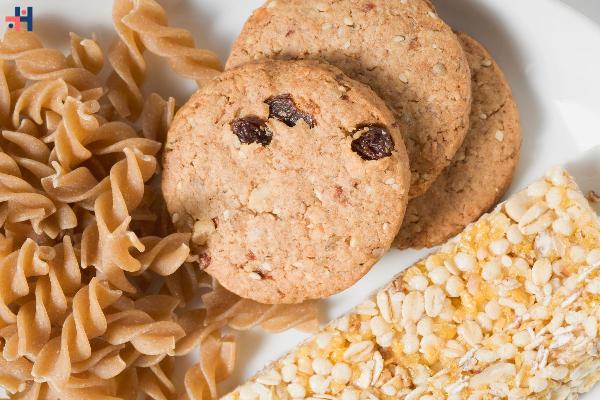 AI Blog Generation – Mass Content at Lightning Speed!
AI Blog Generation – Mass Content at Lightning Speed!
The Ultimate Guide to Wholemeal Foods: Benefits and Varieties
Written by HealthCare360 » Updated on: June 30th, 2024

The Ultimate Guide to Wholemeal Foods: Benefits and Varieties
The Ultimate Guide to Wholemeal Foods | Healthcare 360 Magazine
In today’s fast-paced world, maintaining a healthy diet can be challenging. However, one simple change you can make is incorporating wholemeal foods into your daily meals. These are not only nutritious but also offer a myriad of health benefits. So, why not give your diet a wholesome makeover? Let’s dive into its world and discover why it should be a staple in your pantry.
What Are Wholemeal Foods?
These are made from whole grains that contain all parts of the grain kernel – the bran, germ, and endosperm. Unlike refined foods, which strip away the bran and germ during processing, these foods retain their natural nutrients and fiber.
Difference Between Wholemeal and Refined Foods
The primary difference lies in the processing. Refined foods, such as white bread and white rice, undergo processing that removes the bran and germ, resulting in a loss of essential nutrients and fiber. Wholemeal foods, on the other hand, maintain the grain’s integrity, providing more vitamins, minerals, and fiber.
Health Benefits
Nutritional Value
These are packed with essential nutrients, including B vitamins, iron, magnesium, and fiber. These nutrients play a vital role in maintaining overall health and well-being.
Impact on Digestive Health
The high fiber content in these foods aids in digestion and helps prevent constipation. Fiber adds bulk to the stool, making it easier to pass and promoting regular bowel movements.
Benefits for Heart Health
Consuming these foods can lower the risk of heart disease. The fiber, antioxidants, and healthy fats found in whole grains help reduce cholesterol levels and improve heart health.
Role in Weight Management
These foods are more filling than their refined counterparts, which can help control appetite and reduce overall calorie intake. This makes them an excellent choice for weight management.
Influence on Blood Sugar Levels
These foods have a lower glycemic index, which means they cause a slower, more gradual rise in blood sugar levels. This is particularly beneficial for individuals with diabetes or those at risk of developing the condition.
Types of Wholemeal Foods
Wholemeal Bread
The Ultimate Guide to Wholemeal Foods | Healthcare 360 Magazine
Wholemeal bread is a nutritious alternative to white bread. It’s made from wholemeal flour, which retains all parts of the grain, providing more fiber and nutrients.
Wholemeal Pasta
Wholemeal pasta is another great way to incorporate whole grains into your diet. It has a slightly nutty flavor and pairs well with a variety of sauces.
Wholemeal Rice
Wholemeal rice, also known as brown rice, is less processed than white rice and retains its bran and germ layers, making it more nutritious.
Wholemeal Flour
Wholemeal flour can be used in baking to add a nutritious twist to your favorite recipes. It works well in bread, muffins, and even pancakes.
Wholemeal Cereals
Start your day with wholemeal cereals. They are an excellent source of fiber and can keep you full throughout the morning.
Incorporating Wholemeal Foods into Your Diet
Breakfast Ideas
Wholemeal toast with avocado and eggs
Wholemeal pancakes with fresh fruit
Wholemeal porridge with honey and nuts
Lunch Options
Wholemeal wrap with hummus and veggies
Wholemeal pasta salad with cherry tomatoes and spinach
Wholemeal sandwich with lean turkey and lettuce
Dinner Recipes
The Ultimate Guide to Wholemeal Foods | Healthcare 360 Magazine
Wholemeal pizza with a variety of vegetables
Wholemeal rice stir-fry with tofu and broccoli
Wholemeal spaghetti with marinara sauce and meatballs
Snack Suggestions
Wholemeal crackers with cheese
Wholemeal banana bread
Wholemeal cookies with dark chocolate chips
Common Myths
Myth: These Foods Are Bland
Many people believe that these foods are tasteless. However, with the right recipes and seasoning, these foods can be delicious and flavorful.
Myth: These foods Are Expensive
While some wholemeal products might be pricier than their refined counterparts, the health benefits they offer make them a worthwhile investment.
Myth: Wholemeal Foods Are Hard to Find
These foods are widely available in most grocery stores. Look for them in the health food section or the baking aisle.
Myth: These Foods Are Only for Health Nuts
These foods are for everyone! They provide essential nutrients that benefit people of all ages and lifestyles.
How to Choose Quality Wholemeal Products
Reading Labels
When choosing wholemeal products, it’s important to read the labels. Look for products that list whole grains as the first ingredient.
Trusted Brands
Some brands are known for their quality wholemeal products. Do some research and find brands that you trust.
What to Avoid
Avoid products that contain a lot of added sugars or preservatives. These can negate the health benefits of these foods.
Storing and Preserving
Proper Storage Techniques
Store wholemeal products in a cool, dry place. Wholemeal flour, in particular, should be kept in an airtight container to prevent it from going rancid.
Shelf Life of Wholemeal Products
Wholemeal products have a shorter shelf life than refined products because they contain natural oils that can spoil. Check expiration dates and use products promptly.
Wholemeal Foods for Specific Diets
The Ultimate Guide to Wholemeal Foods | Healthcare 360 Magazine
Vegetarian Diet
These foods are a great source of protein and fiber for vegetarians. They can be incorporated into a variety of dishes to ensure a balanced diet.
Vegan Diet
Vegans can benefit from the nutrients found in these foods. Wholemeal pasta, bread, and rice are all excellent options.
Gluten-Free Diet
For those with gluten sensitivities, there are wholemeal options made from gluten-free grains like buckwheat, quinoa, and millet.
The Environmental Impact
Sustainable Farming Practices
Many of these foods are produced using sustainable farming practices. This helps protect the environment and promotes biodiversity.
Reducing Food Waste
These foods have a lower environmental impact because they use the entire grain, reducing food waste.
Challenges and Solutions in Transitioning to Wholemeal Foods
Overcoming Taste Preferences
It can be challenging to switch from refined to wholemeal foods. Start by gradually incorporating wholemeal products into your diet and experimenting with different recipes.
Budget-Friendly Tips
These foods can be affordable if you know where to look. Buy in bulk, look for sales, and consider making your own wholemeal products at home.
Finding Recipes the Whole Family Will Love
Look for wholemeal recipes that are kid-friendly and easy to make. Involve your family in the cooking process to make it more enjoyable.
The Future of Wholemeal Foods
Innovations in Wholemeal Products
The food industry is continuously innovating, and wholemeal products are no exception. Expect to see new and exciting wholemeal options in the market.
Growing Popularity
As more people become health-conscious, the demand for these foods is increasing. This trend is likely to continue in the future.
FAQs
What are the best wholemeal foods for weight loss?
Wholemeal bread, brown rice, and wholemeal pasta are excellent options for weight loss as they are filling and low in calories.
Can children eat wholemeal foods?
Yes, these foods are safe and nutritious for children. They provide essential nutrients needed for growth and development.
Are wholemeal foods suitable for people with diabetes?
These foods have a lower glycemic index, making them a better choice for people with diabetes.
How can I make wholemeal foods more appealing to picky eaters?
Incorporate these foods into dishes they already love. For example, use wholemeal pasta in their favorite pasta dish or wholemeal flour in cookies.
What are some quick wholemeal snacks?
Wholemeal crackers with cheese, wholemeal banana bread, and wholemeal cookies are all quick and nutritious snacks.
Conclusion
Incorporating wholemeal foods into your diet can have numerous health benefits. From improving heart health to aiding in digestion, these nutrient-dense foods are a great addition to any meal. Start small by adding wholemeal products to your favorite recipes and enjoy the wholesome goodness they bring.
Note: IndiBlogHub features both user-submitted and editorial content. We do not verify third-party contributions. Read our Disclaimer and Privacy Policyfor details.
Copyright © 2019-2025 IndiBlogHub.com. All rights reserved. Hosted on DigitalOcean for fast, reliable performance.












